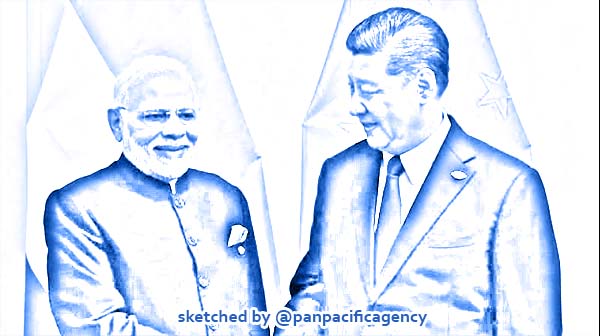RCEP could have hurt Indian economy: Minister

Prime Minister Narendra Modi on Wednesday met Chinese President Xi Jinping and said there has been a "new direction and new energy" in bilateral ties after their second informal summit in Chennai as the two leaders discussed ways to further strengthen India-China relations, including on the trade front. (Photo: Twitter/ Narendra Modi). Sketched by the Pan Pacific Agency.
NEW DELHI, Nov 19, 2020, Financial Express. India could have suffered negative consequences if the country had joined the Regional Comprehensive Economic Partnership (RCEP) trade deal; however, India is interested in a “fair and balanced” free trade pact with the European Union (EU), said S Jaishankar, Minister of External Affairs, Financial Express reported.
The present form of RCEP is not in India’s interest as it is against India’s generic position on trade, Jaishankar said while speaking on India-EU relations organised by the Centre for European Policy Studies. It is to be noted that India flagged its concerns with RCEP at the East Asia Summit last year because a number of key concerns had not been addressed during the prolonged negotiations for the trade deal.
Free Trade with European Union
Demanding a fair and balanced Free Trade Agreement with the European Union, the minister said that the Indian government had spoken of the need to resume negotiations on this matter. The 10 member states of the Association of Southeast Asian Nations (Asean) and Australia, China, Japan, New Zealand, and South Korea signed RCEP on Sunday. However, the current declaration left an open window for India to join the world’s largest trading bloc, covering nearly a third of the global economy.
Speaking about the FTA with the EU, Jaishankar underlined that it is not an easy negotiation and instead it must be the most difficult negotiation in the world because it is a very high standard FTA. He highlighted that both sides were looking at various proposals that include a separate agreement on investments or an early harvest deal.
The external minister listed out that India wants to ensure mobility or migration is legal to prevent any exploitation of workers, and mobility agreements allow countries to “work out the rules of the game” and eradicate “bad practices”. Meanwhile, India was part of the RCEP negotiations for nearly seven years. The unresolved issues included inadequate protection against import surge, lack of credible assurances to India on market access, non-tariff barriers and possible circumvention of rules of origin by certain countries.